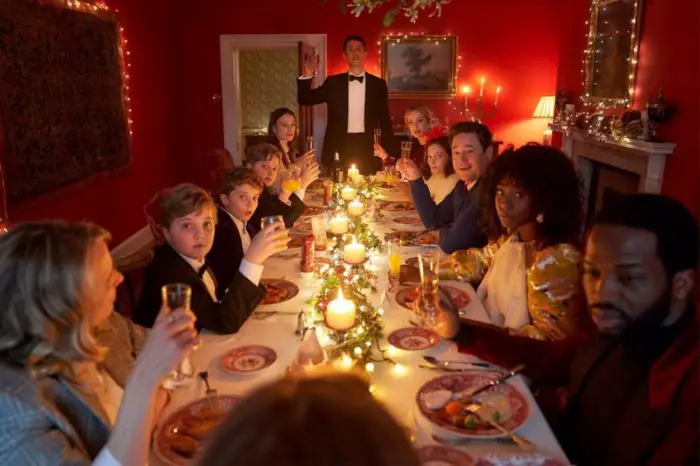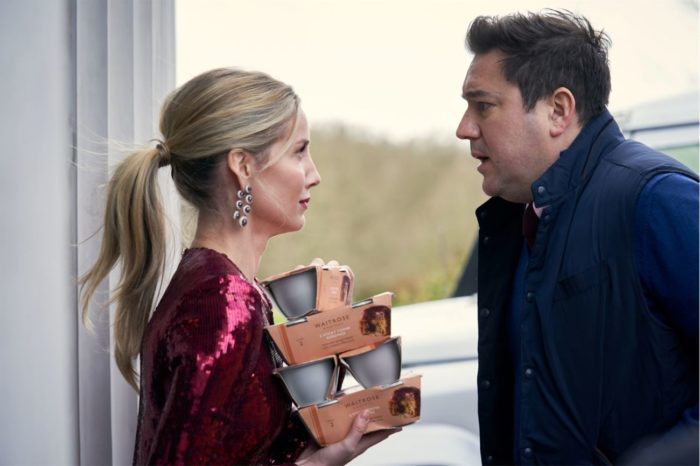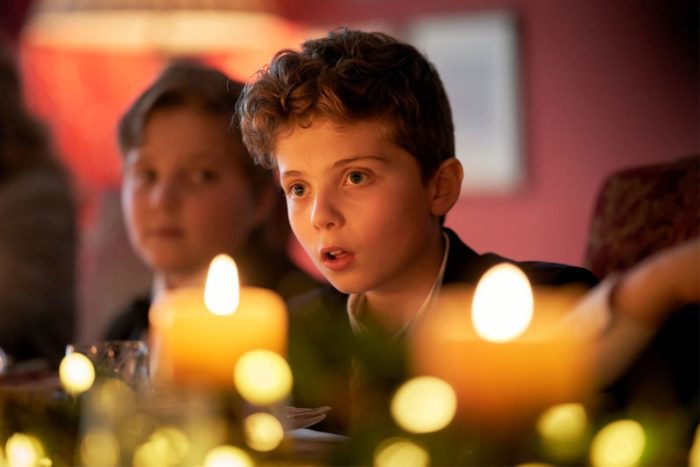You’re not going to find a more divisive film in 2021 than Silent Night. The other day, I wrote about Shudder’s The Advent Calander being dismally bleak, but wow. Silent Night is staunchly abysmal. Unlike most people who are likely going to go in cold to the film when it opens in theaters and premieres on AMC+ this weekend, I knew what I was getting myself into. I saw the cast’s first images toasting around the festive table, read the synopsis, and watched the trailer. Still, nothing prepared me for Silent Night. People are going to despise it with every ounce of their being. That being said, it’s absolutely fu*king brilliant.
When I found Silent Night a few months ago, I was captivated by the immensely talented cast. Pirates of the Caribbean‘s Kiera Knightly, Malignant’s Annabelle Wallis, A Discovery of Witches’ Matthew Goode, The Good Place’s Kirby Howell-Baptiste, and Jojo Rabbit’s young star Roman Griffin Davis are only part of the complete ensemble. It made it hard to believe there wasn’t a lot of buzz for the film, but given its nature, I see why now.

If you are someone that is just noticing Silent Night being promoted on your AMC+ subscription or wanted to know more based on the trailer, I can tell you this isn’t a pleasant yuletide foray into a jolly happy Christmas setting. And by no means should you watch this one with your children unless you want to answer a lot of questions at the end. Silent Night is about the end of the world. And though the festivities start off cheery enough, with the cast singing along to Michael Bublé crooning about a Christmas sweater while traveling to an idyllic country estate like you should brace yourself for a Love Actually experience, somewhere around the halfway mark, a thick atmosphere of grief and depression descends on the home. The film then embraces the dormant darkness that has been waiting there from the start.
You hardly notice the rife strain of impending death lingering in any of the guests arriving at the home of Nell (Knightly) and Simon (Goode). Moods are chipper, and there’s an awareness of traditional gatherings as Nell presses a stalk of mistletoe to each bed’s pillow in the house. The feeling of warmth and hospitality imposed by the generous display is bleakly overshadowed by the idea that this isn’t for an impressive blog post or a spot in the next issue of Better Homes and Gardens magazine. Director Camille Griffin provides for us, in those opening moments, a juxtaposition with a plant traditionally associated with love and kisses. The stark reality of the holiday plant is that it’s quite toxic and can be lethal if ingested. The imagery is affecting and dark, reminding us of this visit as a hospice situation, and people are going to die here. That is the nature of the swinging pendulum that is Silent Night.
The breezy and semi-comedic atmosphere brandished by the arriving partygoers is black comedy at its finest. Examples include the morbidly dry niceties surrounding Bella (Lucy Punch) having stolen a coat while her partner, Alex (Howell-Baptiste), suffered a head wound being met by the diplomacy of Nell suggesting Bella should have stolen something for her, too. Events surrounding sticky toffee pudding lead to an off-camera heist of a local gas station to soothe a child’s (Davida McKenzie) last day on Earth wish. A game of charades suggests normalcy, though the charade we see is for the film The Day After Tomorrow, which is a day these characters are not expecting to see. And children pursue a back-and-forth political argument at the dinner table, filled with the misinformation provided by their parents, to point fingers at each other as well as a government that failed to act in preventing the eco-disaster they’re currently facing.

While the early portion of the film is reserved for the ridiculous need to keep up appearances and outwardly suppress the harrowing emotions of imminent death, the film slowly removes the veneer. Simon and Nell’s son, Art (Davis), struggles to accept the fate his parents have force-fed to him. While much of the film deals with the stages of grief and the many spirals people go through before accepting it, Art holds the only candle of hope. He chooses to go against the government recommendation, as well as his parents’ wishes, of giving up on life by swallowing a government-approved “exit pill.” The suicide capsule is said to be the less painful way to die, but Art doesn’t want to die at all. Art wants to try and survive.
Art’s debate at the dinner table, as well as his choosing not to take the government-promoted death pill, may stir some anti-vaxxer praise and pro-vaccine ire. However, director Griffin has flat out stated, in an interview with Abe Friedtanzer for Cinema Daily, that this is not the intention of her film.
I think it’s very, very interesting because I’m passionately pro-vaccine and I think it’s an interesting debate because it’s easy for people to get, ‘Oh it’s an anti-vax film,’ but actually if they understood the film, they’d realize it’s a socialist film.
Full quote: “I think it’s very, very interesting because I’m passionately pro-vaccine and I think it’s an interesting debate because it’s easy for people to get, ‘Oh it’s an anti-vax film,’ but actually if they understood the film, they’d realize it’s a socialist film. And it’s very clear that the people who don’t want to take the vaccine is because they don’t give sh*t about anyone else, so if you care about society you take the vaccine. I’m vaccinated, my family’s vaccinated, the children are vaccinated. So, if you believe in society, which is [what] the film is arguing for, and you believe in the underrepresented and the minorities and government taking care of all, if you believe in a socialist world, well that’s the message of the film. So, for people to misinterpret that as anti-vax, which is the total opposite of the intention of the film, but there is some unfortunate language when the boy uses the word scientist he’s actually talking about college, um, environmentalists. You know? What he’s saying is, ‘How do you know during an emergency that you can trust the information you’re given.’ The film is saying, ‘Think for yourself,’ it’s definitely not saying don’t take the vaccine, so I think it’s a very simplistic slightly ignorant interpretation of the film, and I don’t mean that to be like, ‘Oh everyone is stupid, but I think it’s unfortunate, and it hurts me because if someone understands the film, they understand that I’m encouraging people to think independently of governments that we don’t trust. And yes, they’ve got a vaccine now to us, but they’ve screwed everything else up for years—they still are. So, it’s an anti-government film; it’s definitely not an anti-vaccine film.”

What I found in Silent Night was a pitch-black comedy about death that shifts into a foreboding horror film about suffering from depression and the strength to find a way to live through it. I felt it had this rare kinship to Lars Von Trier‘s Melancholia, where Kirsten Dunst’s character was emotionally contrarian to all of the other characters in the film. Depression can be like that. It makes us see the people around us as having it all together while forcing us to put on a brave face and act like everything is normal. Where Silent Night gets it right is in using these remaining hours to debate the characters’ initial acceptance of the events unfolding before them and start to process their fate over and over again. And, if nothing else, Art is seen fighting for life, and others to do the same.
Silent Night is a rare film. It’s not going to make anyone’s yearly yuletide watchlists, but it is emotionally stirring, provocative, and the ending is both heartfelt and heartbreaking. Roman Griffin Davis is especially fantastic, and he has a bright future ahead of him at this rate. I would say the same of first-time feature writer/director Camille Griffin, mother to actors Roman, Gilby, and Hardy Griffin-Davis, who appear in the movie. Camille has poetically woven together a film for the coronavirus generation using the inauspicious days of lockdown and not knowing who, when, and what to believe. The film isn’t meant as a double entendre, according to Camille, and was written pre-pandemic. Still, the same claustrophobic fear of the unknown and poor event handling has been felt worldwide and will surely resonate with some.
Silent Night.



